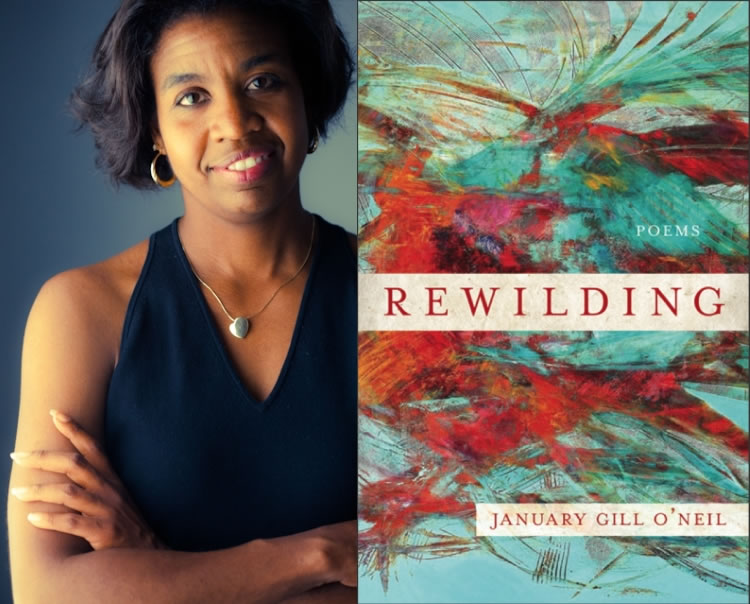In the latest episode of “Village Voice,” Richard Blanco celebrates poetry by January Gill O’Neil.
“…this is something that we find with January’s work, the poems start deceivingly simple, or very generous or accessible, but then really deepen in their content and meaning. And the things she’s able to put together, to connect and make a big statement — like Okra, like a casual comment at a New Year’s Eve party — I love that about her.”
Richard became familiar with January and her work via the Mass Poetry Festival, for which she is the executive director, and highlights “a wonderful event called An Evening of Inspired Leaders,” this Thursday, November 18th from 7 – 8 PM EST.
“They bring together exceptional leaders from all kinds of diverse fields and they read their favorite poems and reflect on the connections to their life and work. There’s one coming up this Thursday – it’s hybrid so you can attend online or in-person. It’s kind of what we do here on the Village Voice, take poems and connect them to issues and see how they rest in our lives, live in our lives.”
Link to attend An Evening of Inspired Leaders at Mass Poetry Festival.
January Gill O’Neil is an assistant professor of English at Salem State University. Her most recent collection Rewilding is available from Cavankerry Press.
Enjoy the conversation and read along with the poems listed.
On Being Told I Look Like FLOTUS, New Year’s Eve Party 2014
Deep in my biceps I know it’s a complement, just as
I know this is an all-black-people-look-alike moment.
So I use the minimal amount of muscles to crack a smile.
All night he catches sight of me, or someone like me,
standing
next to deconstructed cannoli and empty bottles of
Prosecco.
And in that moment, I understand how little right any of
us have
to be whoever we are—the constant tension
of making our way in this world on hope and change.
You’re working your muscles to the point of failure,
Michelle Obama once said about her workout regimen,
but she knows we wear our history in our darkness, in our
patience.
A compliment is a complement—this I know, just as the
clock
will always strike midnight and history repeats. This is how
I can wake up the next morning and love the world again.
About This Poem
“It is a flattering comparison, but I’m keenly aware that I live in a part of the country that’s less diverse. So when people say I look like Michelle Obama, I know they are trying to make a connection with me. This poem is a recognition of the awkwardness, the effort, and the patience it takes to let the moment unfold.”
—January Gill O’Neil
No one believes in you
like I do. I sit you down on the table
& they overlook you for
fried chicken & grits,
crab cakes & hush puppies,
black-eyed peas & succotash
& sweet potatoes & watermelon.
Your stringy, slippery texture
reminds them of the creature
from the movie Aliens.
But I tell my friends if they don’t like you
they are cheating themselves;
you were brought from Africa
as seeds, hidden in the ears and hair
of slaves.
Nothing was wasted in our kitchens.
We took the unused & the throwaways
& made feasts;
we taught our children
how to survive,
adapt.
So I write this poem
in praise of okra
& the cooks who understood
how to make something out of nothing.
Your fibrous skin
melts in my mouth—
green flecks of flavor,
still tough, unbruised,
part of the fabric of earth.
Soul food.
We draw breath from brick
step on stones, weather-worn,
cobbled and carved
with the story of this church,
this meeting house,
where Ben Franklin was baptized
and Phillis Wheatley prayed—a mouth-house
where colonists gathered
to plot against the crown.
This structure, with elegant curves
and round-topped windows, was the heart
of Boston, the body of the people,
survived occupation for preservation,
foregoing decoration
for conversation.
Let us gather in the box pews
once numbered and rented
by generations of families
held together like ribs
in the body politic. Let us gaze upon
the upper galleries to the free seats
where the poor and the town slaves
listened and waited and pondered
and prayed
for revolution.
Let us testify to the plight
of the well-meaning at the pulpit
with its sounding board high above,
congregations raising heads and hands to the sky.
We, the people—the tourists
and townies—one nation under
this vaulted roof, exalted voices
speaking poetry out loud,
in praise and dissent.
We draw breath from brick. Ignite the fire in us.
Speak to us:
the language is hope.
About This Poem
“I wanted to write a poem for Boston’s Old South Meeting House, one of the oldest churches in North America and one of the many sites in Boston National Historical Park. In revolutionary times, this was the place to discuss the issues of the day. Boston Tea Party meetings were held here. Phyllis Wheatley worshipped here. Abolitionists, writers, and thought leaders worked together to save it from the wrecking ball. It is iconic and emblematic of the city’s complicated history. Today, this space inspires a new generation as a museum, and as space for a variety of events, including poetry. And in this time of political divides, I wanted to end on a note of hope.” —January Gill O’Neil
This episode first aired on Boston Public Radio on November 15th, 2021.

